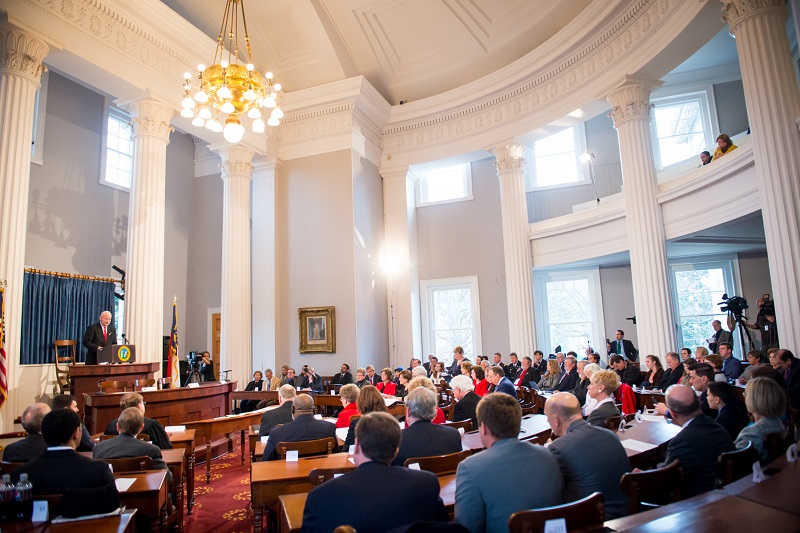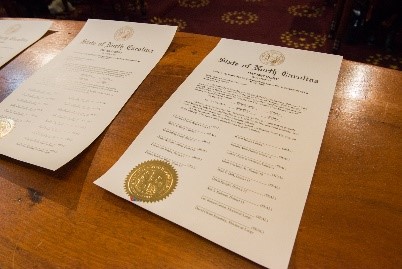Secretary of State and the Electoral College
The North Carolina Secretary of State has the following duties related to the Electoral College and the election for United States President and Vice President:
-
An “elector” is an elected public office in North Carolina. The
US Constitution, North Carolina Constitution, and North Carolina laws
include some limits on holding two public offices at once (called dual office-holding). A violation could mean losing one of the offices. Those limits may apply to electors. Therefore, State law requires us to provide notice about the legal requirements that may limit a person from holding two offices at once. We provide the notice to:
- The political parties, and
- Unaffiliated candidates that qualify to have their names on the ballot for President of the United States.
- The political parties and unaffiliated candidates file the name of their candidates for elector with us.
- After we receive the name of the elector candidates, we notify each elector candidate about the legal requirements related to holding two offices at one time.
- The State Board of Elections certifies the election results and delivers the certifications to us.
- We notify the Governor of the names of the people elected to the office of elector for President and Vice-President of the United States.
- We make all the arrangements for the meeting of the North Carolina Electoral College, including the agenda and invitations to guests.
- After the meeting of the Electoral College is over, the electors give us two copies of their Certificates of Vote to keep as public records.
The Secretary of State does not:
- Decide when elections take place. The North Carolina Constitution and North Carolina General Statutes and the U.S. Constitution and U.S. Code say when elections take place.
-
Conduct elections in North Carolina. The North Carolina State Board of Elections is an independent agency that conducts elections. The Board administers state elections laws, including laws related to:
- Registering to vote
- Filing to run for elected office and running for office
- Campaign finance
- Political parties
- Voting and counting votes
- Decide how the elector nominees are selected by the political parties or the qualified unaffiliated candidates. State law has some general requirements related to that.
- Tell the electors who to vote for or control how the electors vote.
This is a summary offered for informational purposes. We do not offer legal advice.
In North Carolina, elections are conducted by the North Carolina State Board of Elections. The State Board follows North Carolina law to determine which political parties and candidates have qualified to be on the ballot, including candidates for President and Vice President.
The US Constitution and North Carolina law set out requirements for the number of electors as well as some requirements for how the political parties pick their elector candidates.
In North Carolina, state law says that when you vote for a candidate for President and Vice President, you are actually voting for the nominees for electors for those candidates. State law also says that the electors’ names do not appear on the ballot.
Instead, the law requires that parties file the names of their nominees for electors for their candidates for President and Vice-President with the North Carolina Secretary of State. If unaffiliated candidates qualify to have their names on the printed ballots as an unaffiliated candidate, then they also have to file the names of their nominees for electors with the Secretary of State.
After the general election, state law requires that the North Carolina State Board of Elections certify the election results and deliver them to the Secretary of State. State law then says that the Secretary of State has to notify the Governor as to who has been elected to the office of elector for President and Vice-President of the United States.
After the Secretary of State certifies the election results to the Governor, the law says the Governor has to issue a proclamation. The proclamation names the electors. The law also instructs the electors to be present “in the old Hall of the House of Representatives in the State Capitol in Raleigh at noon on the first Tuesday after the second Wednesday in December following their election.”. This year, that is Tuesday, December 17, 2024.
When the Electoral College meets, the electors vote separately for President and Vice-President of the United States. After they vote they sign certificates of the vote. The certificates are distributed according to federal law.
You can watch videos of the 2020, 2016 and 2012 meetings of the North Carolina Electoral College.



